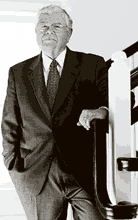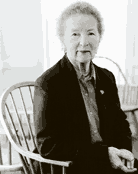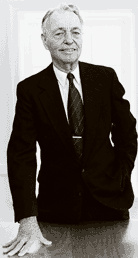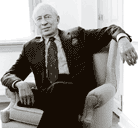
 |
||
The Yale Alumni Magazine is owned and operated by Yale Alumni Publications, Inc., a nonprofit corporation independent of Yale University. The content of the magazine and its website is the responsibility of the editors and does not necessarily reflect the views of Yale or its officers. |
|
Early in the movie About Schmidt, Jack Nicholson is seen sitting in the office he has occupied for decades. The walls are bare, and the floor is filled with stacks of cardboard boxes. As he awaits 5 p.m. and the official end of his career as an actuary for an Omaha, Nebraska, insurance company, a look of grim resignation is chiseled on his face. Whether you are a Midwestern office worker or an Ivy League professor, retirement is one of life’s Big Events, and University officials want to ensure that tenured faculty at Yale don’t await their emeritus years with the same gloomy anticipation as Nicholson’s character. About four years ago, Lisbet Rausing and Joseph Koerner '80 gave Yale $10 million through the Fanny and Leo Koerner Charitable Trust to involve emeritus faculty more actively in the life of undergraduates. The gift was prompted by Koerner’s observation, while teaching art history at Harvard, that many emeriti there appeared detached from university life. So, when he decided to make a gift to Yale in honor of his father, the painter Henry Koerner, he wanted it to address gray matters. President Richard Levin appointed a committee of active and emeritus faculty members to devise a plan; the result was the Henry Koerner Center, a meticulously renovated historic home on Elm Street to be used by emeritus faculty as a place to socialize and work. “The primary purpose of the whole thing is to keep emeritus faculty involved, but what we will do really depends on the desires and interests of the members,” says Bernard Lytton, director of the new center, which opened in January. (Reflections on retirement by Lytton and three other emeriti who are active in the Center follow.) Based on the results of a survey sent to Yale’s roughly 300 emeriti, Lytton already knows a top priority is computer support. Lectures, seminars, opportunities to meet University newcomers, exhibits of emeriti artwork, and a film series are other suggestions he’s considering. “Whatever people are interested in, we’re here to offer the resources to pursue those interests,” says Lytton, the Donald Guthrie Professor Emeritus of Surgery. “Our goal is to provide a place emeritus faculty can call their own, so they won’t feel left out anymore.” Until 1993, Yale professors had to retire at age 70, with the option to work part-time for up to three more years. “Lots of people left town,” Lytton says. “There was no medium for them to be involved with the University, so they just sort of dropped off the edge.” One professor remembers complaining about the identification card he received upon retirement, which said “non-employee” in large letters. Chemical engineering professor John Fenn, who made no secret of his displeasure at being forced out, went to Virginia Commonwealth University in 1994 and got his revenge last year by winning a Nobel Prize. Yale has since changed the ID cards for emeritus faculty, and in 1993, federal law made mandatory retirement illegal. The result has been a shift in the composition of the tenured faculty. According to the Office of Institutional Research, in 1988 none was older than 70. Now it’s close to 7 percent. There has also been a corresponding reduction in the number of younger tenured faculty. In 1988, 22 percent were under 45. By 1998, that number had dropped to 12 percent. This trend is not lost on Yale administrators. “You could say that’s a sub-agenda of the Koerner Center,” says Lytton, “to make retirement look not so grisly, so maybe more people will be encouraged to retire and make room for junior faculty.” One enticement the Center offers is office space for retired faculty—a rarity elsewhere on campus. Located in the top two floors of the Pierpont House on Elm Street (the Visitor Center is on the first floor), the Koerner Center has space to accommodate 12 emeriti on a short-term basis. It also has a seminar room where those who want to teach can hold classes, a lounge, and a private sitting room. Extensive work was done on the 236-year-old house to prepare it for its new role, but from the paint colors to the wavy glass window panes set in nail-free frames, every effort was made to preserve its colonial flavor. Yet the Center also has all the features of a modern academic facility, including a plasma screen TV and hook-ups for PowerPoint presentations. As with the tenured faculty itself, the goal of the renovations is to blend the old with the new and to honor the value of both.
Howard Lamar Howard Lamar knows he’s lucky. He officially retired from Yale at the end of June 1994, but it wasn’t until about two years ago “that I suddenly realized I was indeed retired.” He had been so busy writing, giving lectures, and traveling that he barely had time to unpack his boxes, much less fret about the implications of being an emeritus faculty member. But the landing wasn’t always so soft for Yale professors who suddenly found the “e” word embedded in their titles. “When I came to Yale, you had to retire at 65,” Lamar recalls. “You had to get out of your office in a week, and if you didn’t, your books were removed by University personnel.” Lamar says the treatment of emeritus faculty is vastly improved today. “Now, you can teach, you can have an office, you can continue to be an active member of the University.” He views the Henry Koerner Center for Emeritus Faculty on Elm Street as a “brilliant extension” of the University’s new inclusionary attitude toward retired faculty. Lamar says he anticipated his own retirement with unequivocal enthusiasm. Having served as President of the University for the 1992-93 academic year, followed by another year on the faculty, he says he'd had his fill of meetings, negotiations, and administrative chores. “Not once have I regretted it,” he says. “Emeritus doesn’t mean you stop doing the things you enjoy; it just means you don’t have to deal with all the rest of it.” Lamar takes inspiration from the late Sterling Professor of English Wallace Notestein. “He retired when he was in his mid-60s and produced his best book at the age of 95, so there is life after retirement.”
Marie Borroff When Marie Borroff retired in 1994, nobody who had ever attended one of her classes was surprised to learn that a professor with such an obvious love of teaching would simply find another way to do it. Among the many projects she’s undertaken since her retirement, Borroff started teaching courses online through AllLearn, the joint distance-learning venture operated by Yale, Stanford, and Oxford universities. “It’s great fun,” she says. “If I have time, I’d love to work up another course.” Time would seem to be something a retired professor would have in abundance, but for Borroff, it’s a rare commodity. Besides plumbing the new frontier of cyber-teaching, she’s published a book of poems and a collection of medieval essays. Now she’s working on a long-term translation project. “At a place like Yale, most tenured faculty are very productive after retirement,” she says. “They tend to go on doing what they were doing.” Borroff says she’s found retirement to be the “best of both worlds.” She can still participate in the life of the University, but on her terms. “You’re a part of the place, but not part of the politics anymore,” she says. The one thing she is nostalgic for is the students. “I miss walking around campus and running into them,” she says. “I have friends who say that after they retired, they felt like ghosts. I don’t feel that way, but I understand their point.” Borroff says that before the creation of the Koerner Center, emeritus contact with the University was handled by the department, and some did it better than others. That’s an imbalance she hopes the Koerner Center will rectify by giving all retired professors a chance to stay connected with students and younger faculty members.
Harry Adams If you run into Harry Adams these days, you’re likely to find him wearing a bomber jacket emblazoned with the tuxedo-clad amphibian that adorns all merchandise sold at Toad’s Place, the storied downtown night club. “Oh that,” laughs Adams when asked about the coat. “Mike Spoerndle (the former owner of Toad's) was a fellow at Trumbull College when I was the master, so on my 70th birthday, he gave it to me.” Roadie threads might seem an unusual sartorial choice for a retired divinity school professor, but it’s a vivid symbol of the energetic approach Adams has taken to his retirement. “Like marriage and the birth of your first child, it’s a big transition, no question about that,” Adams says. His way of easing the transition was to opt for a phased retirement. In 1997, he cut back to half time and continued teaching. Then, in 2000, he officially retired, although he came back in 2001 for a semester as acting dean. That was followed by a five-month stint helping the director of the Institute of Sacred Music. “It can be hard,” Adams says. “One day you’re in the midst of all this activity, and the next, you’re totally isolated.” He says Yale became sensitive to the needs of the emeritus faculty out of necessity. “They had to figure out a way to make retirement more attractive to people who, by and large, enjoy what they do.” Adams counts himself among those who “weren’t exactly impatient to retire.” But now that he has made the leap, he says he enjoys his new emeritus life. From auditing a class on the history of Christian art at the Divinity School to attending lectures, concerts, and museum exhibits, he says “I’m finally taking advantage of all the things to do at Yale that I never had time to do before.”
Bernard Lytton In 1987, Bernard Lytton took a bold step to ease himself into retirement after a more-than-full-time career as a physician and professor. “My children were grown, so my wife and I took on 400 new ones,” he says of his decision to step down as chief of surgery and become the master of Jonathan Edwards College. It was a post he held for a decade, followed by a one-year stint as acting master of Branford College. He also continued practicing medicine part time, retained an office at the medical school, and served as a consultant. “I stayed busy,” he says, “so for me, retirement was fairly easy.” Lytton also believes he had an easier time than some Yale professors because he worked in the sciences. “I think it’s harder for people in the humanities and social sciences,” he says. “For one thing, the shortage of office space is much more severe for them than it is for us, so it’s harder for them to find a focal point.” Now that Lytton has taken on the job of director of the Koerner Center, his so-called retirement seems more illusory than ever. Wearing a blue blazer and tie, he hardly looks like a man prepared to spend a day of leisure. And he’s not. Everything from overseeing the placement of hardware on the cabinet doors of the renovated Center to deciding who will receive office space and what programs will be offered are on his radar screen as the man in charge of getting the new facility up and running. For Lytton, helping others transition into retirement could mean he’ll be putting off his own. But he doesn’t seem to mind. “I’m very excited about the Koerner Center,” he says. “That’s why I took on this new job.” |
||||||||||
|
|
|
|
|
|
|
|
©1992–2012, Yale Alumni Publications, Inc. All rights reserved. Yale Alumni Magazine, P.O. Box 1905, New Haven, CT 06509-1905, USA. yam@yale.edu |
||



